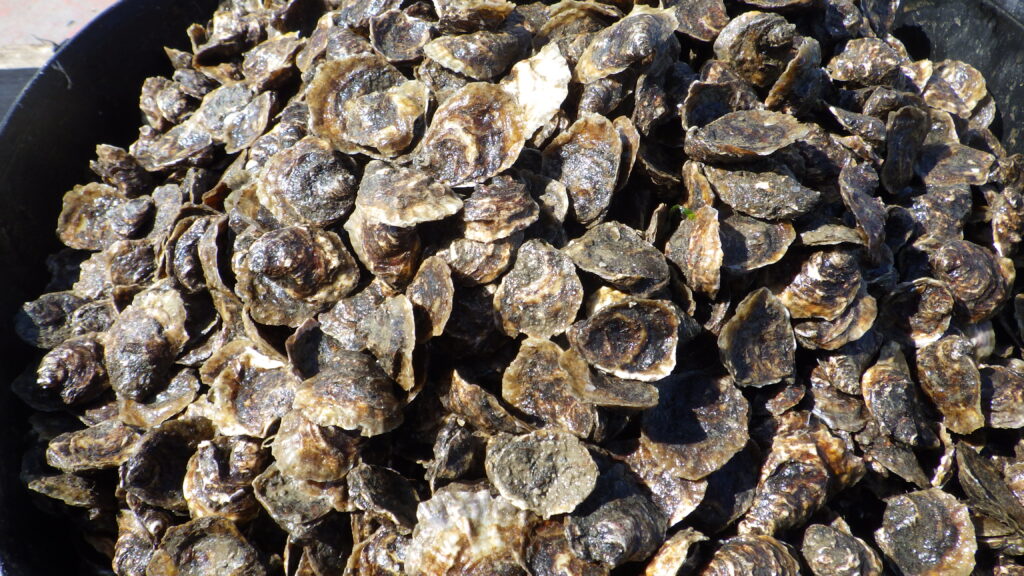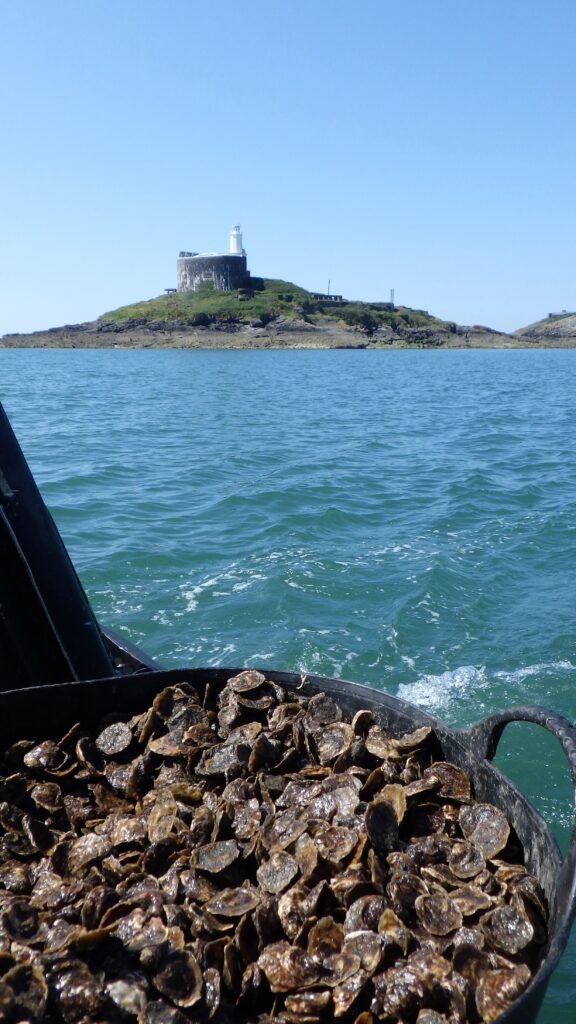New Hope for Native Oysters in Swansea Bay
Europe’s largest native oyster restocking programme has been launched today, 5th August, to coincide with World Oyster Day.
Oyster farmer and marine biologist Dr Andy Woolmer of the Mumbles Oyster Company has teamed up with Kelsey Thompson of Morecambe Bay Oysters’ shellfish hatchery to restock historic oyster beds off Mumbles in Swansea Bay with 4 million juvenile native oysters.

Native oyster populations have declined by 95% in the UK since the mid-19th Century which makes native oyster beds one of the most endangered marine habitats in Europe. European oyster populations collapsed in the early-20th century due to a perfect storm of overfishing, pollution,
disease and habitat loss. In the mid-1800s the oyster industry around Swansea Bay employed hundreds of people with the oyster beds stretching from Porthcawl and along Gower coast. More than 200 oyster smacks were used to transport their catch back to Mumbles until the decline of the fishery. The loss of employment brought serious consequences for local families and an end to many cultural traditions too.
Responding to a Tweet by Kelsey a week ago who had produced 4 million small oysters, which were rapidly outgrowing their home at the hatchery but had no place to go, Andy offered his oyster bed off Mumbles in Swansea Bay and its sister farm at Atlantic Edge Oysters in Angle Bay, Pembrokeshire. At quick 5-minute phone call quickly established a plan of action and with the help local fisherman Barry Thomas the first batch of 125,000 oysters were released today with continued batches scheduled for the rest of the summer and autumn.
Apart from the sheer scale of this undertaking, what sets this oyster restoration initiative apart from others underway across the UK and Europe is that it is a wholly privately resourced project.

Native oyster beds play an important role in maintaining a healthy marine environment by providing a range of ecosystem service benefits to humans including food, carbon storage and sequestration, and improving water quality, as well as wider biodiversity benefits. A single oyster can filter 200 litres per day – if all these oysters survive to become adults that is an astounding 800 million litres of water per day or 320 Olympic sized swimming pools. If successful, the restored oyster beds off Mumbles will play a key role in improving the environment in Swansea Bay.
Supporting local oyster producers helps the environment as well as support local jobs. A recent study report from The Nature Conservancy has found that “Oyster farms proved to be the most effective for increasing species diversity; 30% more species were found to inhabit these farms than areas near the farm. These benefits were the result of providing a structured habitat, food and places to forage, and reproductive grounds for fish.”
If the juvenile oysters the team are relaying on the beds survive the winter their prospects are good and with luck, they will grow on to be harvested in 3-5 years’ time. All the time they are growing on the Mumbles beds they will be reproducing and helping repopulate the wild fishery in Swansea Bay.
At the very heart of this project is the objective to kick start a sustainable fishery and a wider oyster industry in Swansea Bay. The team believe that the time is right to invest their resources here; the Mumbles Oyster Festival has already proved very popular and there is a renewed interest in local seafood with oysters appearing on the menu in restaurants across the region.
Andy Woolmer said, “Native Oyster restoration is a long-term proposition akin to planting a forest. To enable this to happen the reseeding and husbandry needs to happen over a period of years. We think that a private sector approach with sustainable harvesting of adult oysters is the key to making restoration viable over the long-term.”
Kelsey Thompson said, “It’s quite an achievement to have managed to get the first 125,000 oysters in the water in 6 days since our first conversation. It demonstrates what can be done when you have a “can-do” approach and the expertise to do it.”
Barry Thomas said, “I’ve worked with Andy for years and jumped at the chance to help him with the oyster bed restocking. I am very excited about the restocking work and the future prospects for the oyster fishery in the Bay. It will be fantastic to have an oyster fishery in Swansea Bay again which used to be an important winter fishery for us inshore fishermen. Hopefully we’ll be eating local oysters at oyster bars in Mumbles in a few years!”





